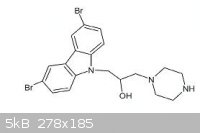Bitburger
Harmless

Posts: 41
Registered: 23-7-2011
Location: Belgium
Member Is Offline
Mood: Experimental
|
|
Alzheimer medication for students
It's maybe a crazy idea but I think that very popular drugs to increase your concentration, like methylphenidate and modafinil should be past time if
there are is Alzheimer medication on the market which improve the cognitive behaviour in peoples...So, also by students.
I know that there are already 3,6-dibromo-9H-carbazole derivates on the market but they seem to work by decreasing mitochondrial apoptosis (cell
death).
I have to do research as student but I'am thinking or this is a useful topic to discuss it...on a molecular level.
Are there researchers who can advise me as a organic chemist whether it is a good idea to invest my money in 3,6-dibromo-9H-carbazole derivates or are
there more exciting molecules who can even give new brain cells instead of protecting these?
However, making people smarter with Alzheimer medication could bea way to get big money for pharmaceutical companies...

Good to be wrong
|
|
|
Rich_Insane
Hazard to Others
  
Posts: 371
Registered: 24-4-2009
Location: Portland, Oregon
Member Is Offline
Mood: alive
|
|
Not long ago Xia Zhang proposed that cannabinoids (he used HU-210) can promote neurogenesis in the hippocampus. Just something interesting I came
across.
|
|
|
Bitburger
Harmless

Posts: 41
Registered: 23-7-2011
Location: Belgium
Member Is Offline
Mood: Experimental
|
|
But according to wikipedia it's analgesic and acting like THC.
The border of science is nowto make human nerve cells to test these new CNS drugs instead of the current 'trail and error" method where they make a
bunch of molecules and hoping that there is one which shows some bioactivity and have not too worse side effects...
However they claim neurogenesis, the issue is that the cells don't differentiate.
Is there no high chance to get brain cancer with these particular drugs?
Good to be wrong
|
|
|
cAMP
Harmless

Posts: 24
Registered: 6-7-2011
Location: East Coast, USA
Member Is Offline
Mood: No Mood
|
|
If you're looking to make people smarter, I'd take a look at an extract of the plant Huperzia Serrata. There is an OTC supplement made from
it, called Huperzine A, which is an anticholinesterase agent. It is also used in the treatment of Alzheimers (although it is less used than
galantamine or donepezil).
It's an interesting molecule, and I can vouch from personal experience that it does noticeably enhance cognitive function.
"You just spent the entire night arguing grand unification theories with Albert Einstein!" - Geordi LaForge
|
|
|
Bitburger
Harmless

Posts: 41
Registered: 23-7-2011
Location: Belgium
Member Is Offline
Mood: Experimental
|
|
But how do I find Huperzia serrata? Yes, there are huge numbers of commercial webshops claiming that they sell huperzine A, but how much do actually
really sell it.
It seems more a commercial product than a scientific proven substance.
Note: according to wikipedia Hyperzia serrata stands on the list of extincted species.
So, I'am sceptic.
Good to be wrong
|
|
|
cAMP
Harmless

Posts: 24
Registered: 6-7-2011
Location: East Coast, USA
Member Is Offline
Mood: No Mood
|
|
Well, yes, it certainly has been commercialized, but that does not make it any less effective. Where did you see that it's an extinct species? I've
read both the articles on Huperzia Serrata and Huperzine A (and many others) and cannot find any mention of its conservation status. The molecule
itself is what's exciting. Not only is it an anticholinesterase, but it is an NMDA receptor antagonist.
Just in case you're wondering, I don't have any financial interest in promoting it  , but I do use it in clinical practice. , but I do use it in clinical practice.
"You just spent the entire night arguing grand unification theories with Albert Einstein!" - Geordi LaForge
|
|
|
Bolt
Hazard to Others
  
Posts: 188
Registered: 26-3-2007
Member Is Offline
Mood: No Mood
|
|
Check out Noopept, N-phenylacetyl-L-prolylglycine ethyl ester.

|
|
|
Nicodem
Super Moderator
      
Posts: 4230
Registered: 28-12-2004
Member Is Offline
Mood: No Mood
|
|
Many nootropic drugs were already briefly discussed on the forum (UTFSE) and from what I remember there was talk that they do little to nothing to a
healthy brain, which is kind of an obvious consequence given their mechanism of action. In animal models (the maze test on rodents is what is usually
used) they do demonstrate statistic effectiveness, but when it comes to the human brain, there isn't much they could do unless the brains are damaged
first (as in various forms of dementia). And even in dementia, they are not equally effective (there are differences, for example, if dementia is
caused by alcohol, Alzheimer, cerebral ischemia, etc.). As far as I know, current medical practice is to prescribe nootropics only for alcohol
dementia and Alzheimer. Particularly Alzheimer dementia is a huge driver for the Big Pharma, as drugs used in its treatment nearly by default became
blockbusters in sales (such as Memantine or Piracetam).
There are many scientific articles on Huperzine A in the literature demonstrating the mechanism of action and effectiveness in animal models. There
are clinical tests as well, but as far as I know, no national regulatory agency approved it yet (but have not checked, maybe the Chinese did by now).
Even the Wikipedia entry lists a short literature review!
…there is a human touch of the cultist “believer” in every theorist that he must struggle against as being
unworthy of the scientist. Some of the greatest men of science have publicly repudiated a theory which earlier they hotly defended. In this lies their
scientific temper, not in the scientific defense of the theory. - Weston La Barre (Ghost Dance, 1972)
Read the The ScienceMadness Guidelines!
|
|
|